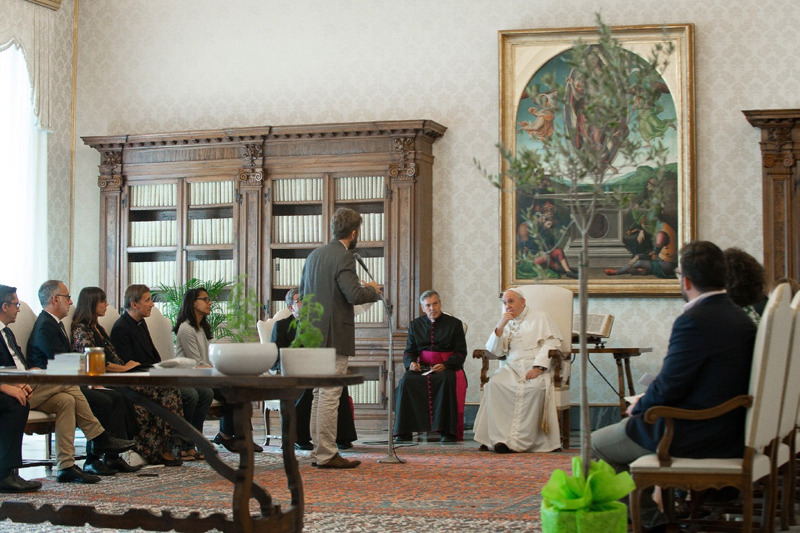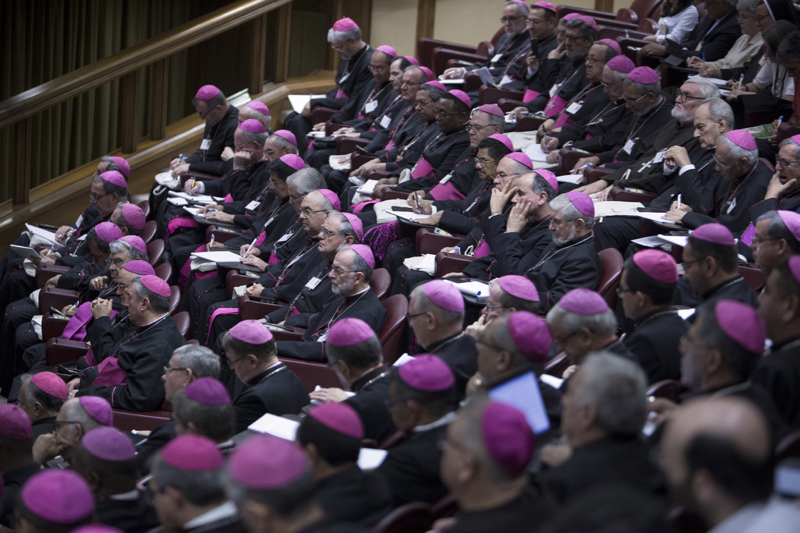Pope Francis decided against giving the green light to married priests after the Amazon synod because he was concerned the debate militated against true discernment.
The pope felt that the discernment became impossible because debate became a parliamentary-style battle between different sides.
He has revealed his thoughts in a note in which the 83-year-old Jesuit Pope also emphasises that the “synod is not over”, calling on the Church to “continue walking together”. These and other comments suggest the door is not closed on future reforms.
In a personal note shared with the Jesuit journal La Civiltà Cattolica, Francis says that during last year's synod there was “a rich discussion…a well-founded discussion, but no discernment”.
The Pope continues: “We must understand that the synod is more than a parliament, and in this specific case, it could not escape this dynamic. On this subject it was a rich, productive and even necessary parliament; but no more than that. For me, this was decisive in the final discernment.”
A majority of bishops attending the October 2019 synod gathering voted in favour of ordaining married men as priests for remote parts of the Amazon rainforest, where communities are unable to celebrate the sacraments regularly. But sources inside the synod say the proposal was strongly resisted by senior prelates in the Roman Curia who succeeded in blocking any immediate change.
The pope says that sometimes, "an atmosphere occurs that ends up distorting, reducing and dividing the synodal hall into dialectical and antagonistic positions that do not help in any way the mission of the Church. [This is] because everyone entrenched in ‘his truth’ ends up becoming a prisoner of himself and his positions, projecting his own confusions and dissatisfactions into many situations. Thus, walking together becomes impossible.”
Following the synod meeting, the pope issued his response, in the form of an apostolic exhortation titled Querida Amazonia, where he avoided any reference to married priests. The Pope only called for missionary clergy to be sent to the Amazon, and for bishops to promote prayers for priestly vocations.
Francis did, however, endorse the bishops' final document where 128 voted in favour of ordaining married deacons in remote regions, and 41 voted against. It meant that while married priests are off the table in the short term, it remains a live possibility.
The Pope's note on the Amazon synod is published in an instructive article by Fr Antonio Spadaro, the director of La Civiltà Cattolica, reflecting on Francis' governance style.
At its heart, the Jesuit priest says, the pope is encouraging discernment, and opening up processes for renewal rather than enforcing a particular agenda. “It is not about constructing a road map of institutional reforms,” Fr Spadaro says.
He emphasises how the pope's governance vision is rooted in Francis' formation as a Jesuit with its focus on listening, silent prayer, analysis of reality and discerning good and evil spirits. The Society of Jesus was founded by St Ignatius of Loyola in 1534 and Francis is the first Jesuit pope.
“The synod, therefore, is a place of discernment in which proposals emerge,” Fr Spadaro explains.
“The pontifical magisterium [teaching] that flows from it with the Apostolic Exhortations is one of listening to the proposals, but also of discerning the spirit that expresses them – beyond any media pressure or referendum majorities.
“It also assesses whether there was really a discernment or was it rather a dispute. And then he [Francis] evaluates whether he is enabled to make a decision or not. If the conditions are not met, the Pope simply does not proceed, without, however, denying the validity of the proposals. Instead, he asks to continue in discernment and leaves the discussion open.”
The Amazon synod also looked at the question of ordaining women deacons, with the pope setting up a new commission to look at this topic following last October's meeting.
Earlier this year, Mauricio Lopez, a key figure at the Amazon synod, explained how the issue became polarised, echoing the Pope's concern about polarisation.
“You could see how the sense of discernment somehow got lost and became more like a political arena, so it was difficult for the Pope to push forward with that, even though we had some good achievement there,” Lopez told The Tablet.
“On some topics, things became so polarised that we couldn't deliver what the Pope needed: he needed to feel consensus, and there was no consensus.”
For Francis, Fr Spadaro writes, not every problem has to be solved immediately, and it is the reform process which is vital. The Pope has repeatedly called for a “synodal Church”, one that is in a constant discernment, and searches for renewal. In Germany, a two-year synodal process has been launched while in Australia, a landmark national gathering is due to take place later this year.
Nevertheless, the focus on synods, and the opening up of debate, has unleashed internal battles inside the Church. All of Francis' synod gatherings have been criticised by traditionalist Catholics, while some reform-minded Catholics have been left frustrated by the slow pace of change. In an attempt to set out what a synodal Church looks like, the Pope has announced the 2022 synod of bishops will take up the theme of “synodality”.
Fr Spadaro says that reform is sometimes about taking a small step, with the Pope taking inspiration from a saying which articulated the vision of St Ignatius. It advises “not to be limited by the greatest and yet to be contained in the tiniest – this is the divine”.
Fr Spadaro explains: “The great reform project can be realised in the slightest gesture, in the small step, even in the meeting with a person, for example, or in the attention to a particular situation of need.”
What the Pope seeks to avoid is becoming entrenched in “right” or “left” positions, something which detaches the Church from the real world, and makes it insensitive to history. Although this is a temptation from across the Church spectrum, Fr Spadaro references the hardliners who sought to reprimand the Pope over his family life document, Amoris Laetitia, which opened the way for divorced and remarried Catholics to receive communion. The Amoris Laetitia apostolic exhortation was written following two synod gatherings of bishops.
In one case, a group of cardinals, led by United States’ Cardinal Raymond Burke, openly challenged the Pope's family life teaching with Cardinal Burke threatening to issue Francis with a “fraternal correction”.
Fr Spadaro writes that embroiling the Church in ideological disputes is seen “for example, when figures arise who seem to want to replace the Pope in the defence of doctrine or true reform, or when they sow uncertainty and confusion, even allowing us to imagine dangers for orthodoxy or for change. And this in particular when, in assuming such attitudes, hypocrisy leads one to openly profess ‘filial devotion’ to the Holy Father and a spirit of respectful ‘fraternal correction’.”
Soon after his 2013 election, the Pope was described as “the turnaround CEO” by the Economist for the way he had helped bolster the Church's credibility of a torrid few years of scandals. Seven years into his pontificate, and it is clear that Francis’ reforms go beyond the merely cosmetic: he is seeking a profound spiritual reawakening in the life of the Catholic Church.



 Loading ...
Loading ...